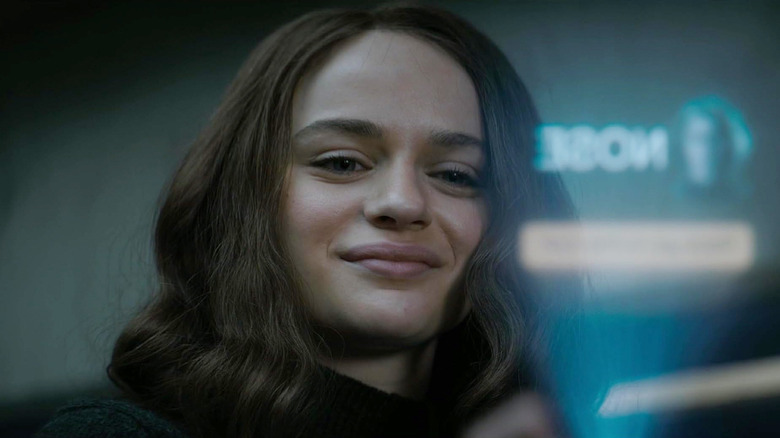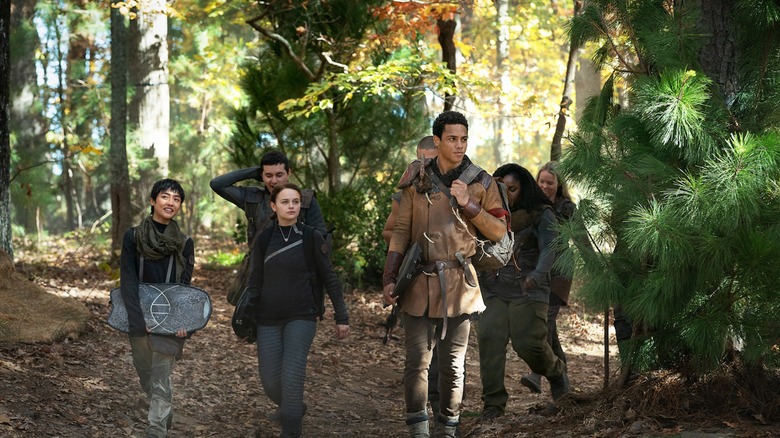McG's Dystopian Sci-Fi Movie With Joey King & Chase Stokes Blows Up Netflix's Top Charts
Scott Westerfield's 2005 dystopian novel "Uglies" appeals to fans of the YA dystopia genre for hyperspecific reasons. It fleshes out a post-scarcity future that dabbles in superficiality, establishes adolescent personhood that clashes with these problematic ideals, and verbalizes the visceral anxieties of growing up in a world that favors a very narrow definition of what is beautiful. These concepts are molded convincingly in Westerfield's capable hands, and it is not difficult to gauge why the book is popular among its intended demographic; it is well-written, underscores a shared experience, and imbibes all qualities of a page-turner. However, in director McG's (aka Joseph McGinty Nichol) hands, "Uglies" has been molded into a drab, incoherent YA adaptation that does not even pretend to explore Westerfield's rich, exciting world.
This hasn't stopped the Joey King and Chase Stokes-starrer from reigning supreme on the U.S. Netflix charts, where it is currently sitting at No.1 among films, having dethroned the massively enjoyable "Rebel Ridge" since its premiere on September 13, 2024 (via FlixPatrol). While some baffling titles often snake their way to the top of Netflix's Top 10 charts, the explosive popularity of "Uglies" makes little sense. The film has been subject to ridicule by critics and audiences alike, with its Rotten Tomatoes metrics speaking for themselves. But hey, stranger things happen on this earth, and it is likely that "Uglies" sitting at No.1 has more to do with morbid curiosity than actual appreciation of an experience devoid of depth or ingenuity. That being said, let us dive into what the film is really about.
In Uglies, existence is skin-deep
The following contains spoilers for "Uglies."
"Uglies" spins a bare-bones backstory about a world devoid of natural resources, where scientists have painstakingly created genetically modified orchids as an energy source (?), along with a surgical procedure to make everyone "pretty." The reasons behind this mandate are justified meticulously in Westerfield's book, but the film settles for an explanation along the lines of it being a method to prevent chaos, as it will help hone a perfect society. Every "Ugly" undergoes this surgery once they turn 16, and once they transform into a "Pretty," a city-wide celebration is held.
Tally (King) and her best friend Peris (Stokes) are deemed "Uglies," and the latter gets his surgery, before which they promise to remain friends forever, as appearances hardly matter in friendship, right? However, Peris' personality undergoes a drastic change along with his appearance, and Tally is rattled by this realization. Soon after, she becomes involved in a conspiracy involving other characters, whose motivations are shaped by the societal categorization they are forced to embrace based on their appearance. Before you know it, a rebellion against the system starts to brew and the lies concocted around the empowered "Pretties" are dismantled, revealing that true beauty lies within.
... Which it does. Nevertheless, "Uglies" does not have the depth to tackle these themes within a dystopian context, and much of the complexities in the source material are discarded in favor of flashy, CGI-heavy sequences that make the worldbuilding feel even more brittle. For a film that seems to rally for authenticity, it barely embodies this sentiment, as neither its script nor performances are substantial enough to ground a premise that could have been meaningful — enjoyable even — when done justice to.
"Uglies" is currently streaming on Netflix.

